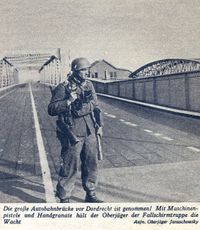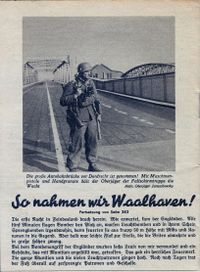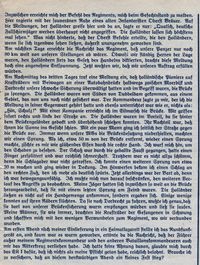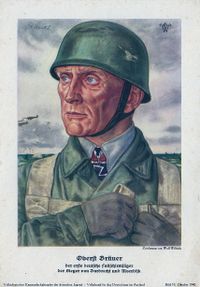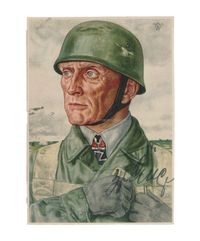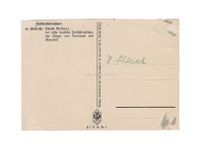Propaganda material.
On this page, you will find original propaganda material from the Second World War about Dordrecht.
The photos below are from the German propaganda magazine "Der Adler." This magazine primarily focused on the achievements of the Luftwaffe during the Second World War. This edition creates a platform for Hauptmann Karl Lothar Schulz, who, as the commander of the 3rd battalion of FJR 1, led the attack on Waalhaven with his men. It vividly describes how Hauptmann Schulz bravely fulfills his mission and subsequently moves his battalion to Dordrecht. It is likely a combination of different events during May 1940 in Dordrecht, often inaccurately or exaggeratedly described. The way the whole article is written almost turns it into an adventurous boys' book. Despite multiple violations of the laws of war committed by Hauptmann Schulz, he was awarded the Knight's Cross of the Iron Cross.
The following map is a propaganda card from the commander of Fallschirmjäger Regiment 1 during May 1940 and the battle of Dordrecht. Cards like these were often issued in Nazi Germany. It was quite common to give highly decorated military personnel a sort of hero status. This was done, among other things, by issuing this type of propaganda cards.
The card below is in fact the same card as shown above, but in postcard format. What is remarkable about this card, however, is that it is signed by Oberst Bruno Bräuer, the commander of Fallschirmjäger Regiment 1. In some cases, these Willrich cards were signed by the person depicted on the card. Oberst Bruno Bräuer was awarded the Knight's Cross on May 24, 1940, for his actions during May19440 in the Netherlands. He played a significant role in the battles in May 1940 in Dordrecht and Moerdijk. He was also the first paratrooper to jump out of an airplane on May 11, 1936, and the first to be awarded the Fallschirmschützenabzeichen. In 1938, he became the commander of the first parachute unit in the Luftwaffe. After the campaign in the Netherlands, he saw action again in the large scale paratrooper landings in Crete. He then became the commander in Crete in November 1942, where he actually had a friendly attitude towards the people of Crete. He even freed 100 prisoners on the island and became known as the most humane commander of Crete. In 1944, General Friedrich-Wilhelm Müller succeeded him, a general known for his cruelty. Meanwhile, Bräuer had become a Major General in the 9th Fallschirmjäger Division and fought in Ukraine and at the Seelöw Höhe near Berlin. His inexperienced troops mass-deserted, causing the lines to collapse. Bräuer suffered a nervous breakdown and was relieved of his command. After the war, Bräuer was prosecuted in Greece for crimes against the inhabitants of Crete. He was executed by firing squad at 5 o'clock on May 20, 1947. Historian Antony Beevor describes him as 'a truly unfortunate man' who was executed for crimes 'committed under another general'. *1
©2017-2025 :Https://www.Dordrechtindeoorlog.nl: ( There is a copyright on the content of this website. This content is not to be shared, duplicated or published withouth the explicit permission of the author of this website. If you have any requests you can email to: Info@Dordrechtindeoorlog.nl or look on : www.dordrechtindeoorlog.nl/termsofuseforthecontentonthiswebsite.
*1 Source: https://military-history.fandom.com/BrunoBräuer.
.jpg/picture-200?_=181c4629296)
